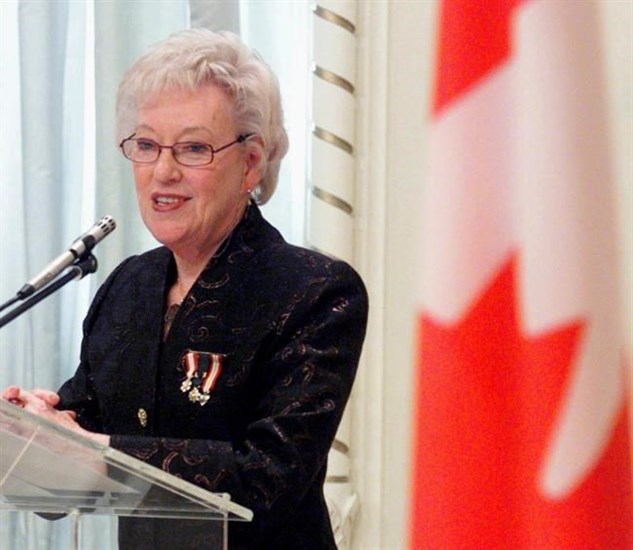
Flora MacDonald speaks after receiving the Pearson Peace Medal from Governor General Adrienne Clarkson at a ceremony at Rideau Hall in Ottawa, Friday, March 24, 2000. MacDonald, who served as a senior cabinet member in two Conservative federal governments and made a run for the party's leadership in 1976, has died.
Image Credit: THE CANADIAN PRESS/Jonathan Hayward
July 26, 2015 - 4:30 PM
OTTAWA - Flora MacDonald, who served as a senior cabinet member in two Conservative federal governments and made a run for the party's leadership in 1976, died Sunday. She was 89.
MacDonald's long-time executive assistant Margit Herrman says MacDonald died in Ottawa _ the cause of death was not immediately available.
MacDonald was the first woman to hold the foreign affairs portfolio, handling the job in Joe Clark's short-lived government in 1979 and early 1980.
She headed the department during the Iranian hostage crisis when Canadian diplomats gave shelter to six Americans who escaped capture when their embassy was overrun by student demonstrators.
She was among the first to hear that Canada's ambassador in Iran, Ken Taylor, was hiding the diplomats. MacDonald pulled Clark out of the House of Commons to brief him.
Over following weeks, she and Clark worked to manage the carefully guarded secret and handle the rising tensions at home while overseeing plans to spirit them out of Iran, which occurred 79 days later.
Former U.S. President Jimmy Carter, who was in office during the affair, mentioned MacDonald's role in the affair during a 2012 speech at Queen's University in Toronto.
Carter said he called Clark "and thanked him and Flora MacDonald for having orchestrated one of the most remarkable rescue operations in history."
MacDonald was born in 1926 in Cape Breton, Nova Scotia.
She first appeared on the Conservative Party scene in the 1950s as a secretary for one of John Diefenbaker's party organizers. Her former colleagues, however, said her determination and ambition marked her as someone likely to rise much higher.
She was first elected to the House of Commons in 1972, after successfully running as the Progressive Conservative party candidate in the Ontario riding of Kingston and the Islands. She held the riding until her defeat in 1988.
Hugh Segal, Brian Mulroney's former Chief of Staff, describes MacDonald as an early feminist who was unafraid to take on the male-dominated world of politics despite her humble Cape Breton roots.
"She made it perfectly clear that women had an absolute right to participate as individuals who were not in any way diminished or limited by gender," he said.
MacDonald also served in the government of Brian Mulroney, where she held the posts of Minister of Employment and Immigration and later Minister of Communications.
Reached by phone, Mulroney said MacDonald's "incredible determination" allowed her to succeed with the "very sensitive" portfolios she held.
"She was disciplined and focused and hard working, and she rose," he said.
MacDonald ran for the leadership of the Progressive Conservative party in 1976. Although she was thought to have a good chance of winning, Clark became leader.
Nevertheless, her former Progressive Conservative colleagues remember her candidacy as a turning point for the party.
"For a single woman from North Sydney to accomplish what she did in the highly competitive male-oriented world in those days is remarkable and she did it on her own," Mulroney said.
"Hard work, determination, the capacity to understand the nature of politics and how one get ahead, and how one promotes ideas that benefit the country... Flora was extremely good at that," he said.
MacDonald retired from politics after her election defeat in 1988 and concentrated on humanitarian work.
She toured the developing world as a human rights observer, hosted a television series on Third World Development and made at least 12 visits to Afghanistan with the organization Future Generations.
She received the Order of Canada in 1992, where she was cited for her "distinguished leadership in federal politics" and her humanitarian work.
A number of politicians have expressed their condolences on Twitter, including Clark.
"I mourn the passing of Flora MacDonald, whose compassion, leadership & example changed lives across our country & around the world," he wrote.
Prime Minister Stephen Harper also posted his condolences on Twitter as did former Prime Minister Kim Campbell, Liberal Leader Justin Trudeau and NDP Leader Thomas Mulcair also expressed their condolences.
Transport Minister Lisa Raitt saluted MacDonald as a trailblazing female politician and fellow Nova Scotian.
"Min. MacDonald demonstrated that any career was possible," she tweeted. "She cleared our path and I am grateful."
News from © The Canadian Press, 2015